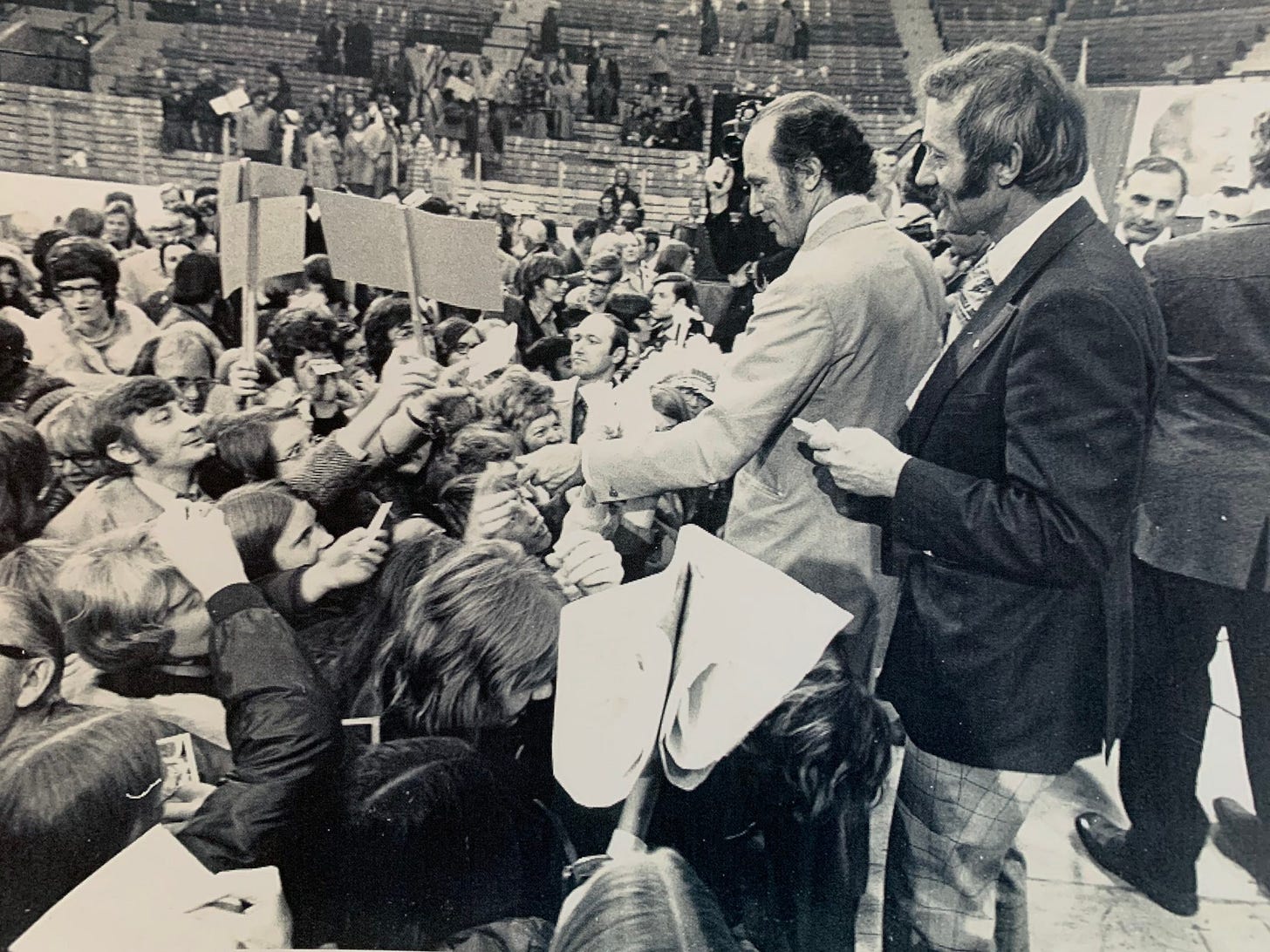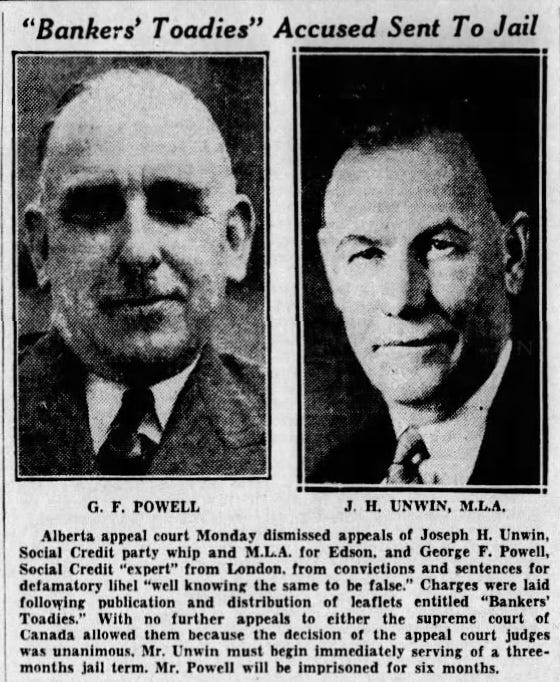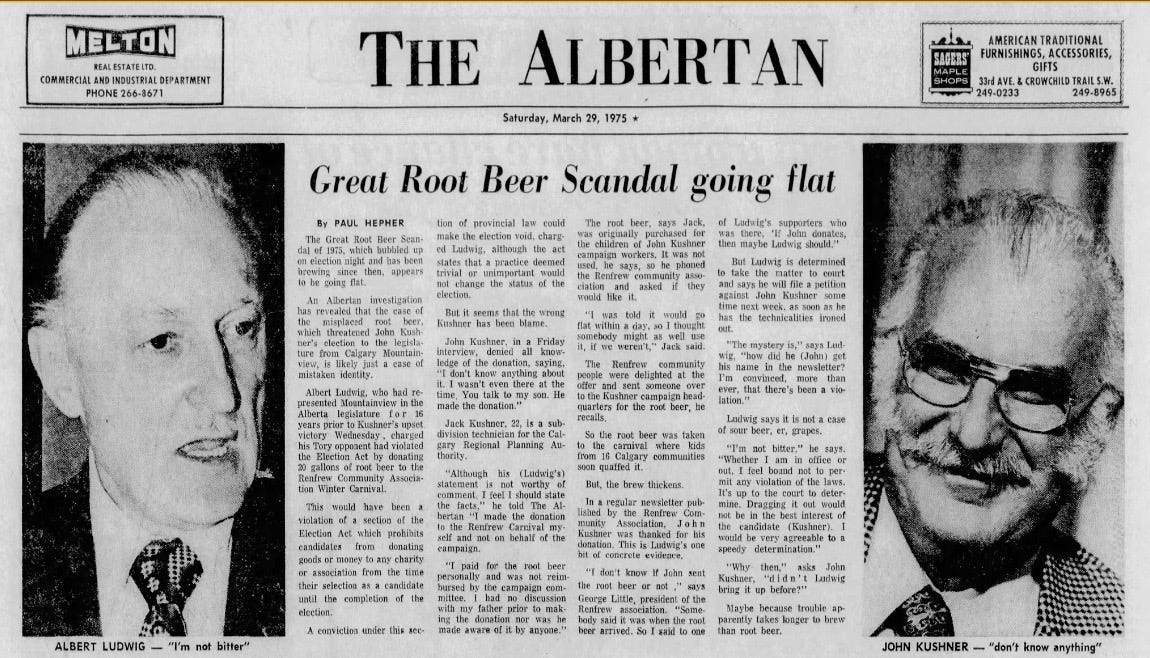8 colourful characters from Alberta’s history worth reading about
Alberta politics is sometimes larger than life.
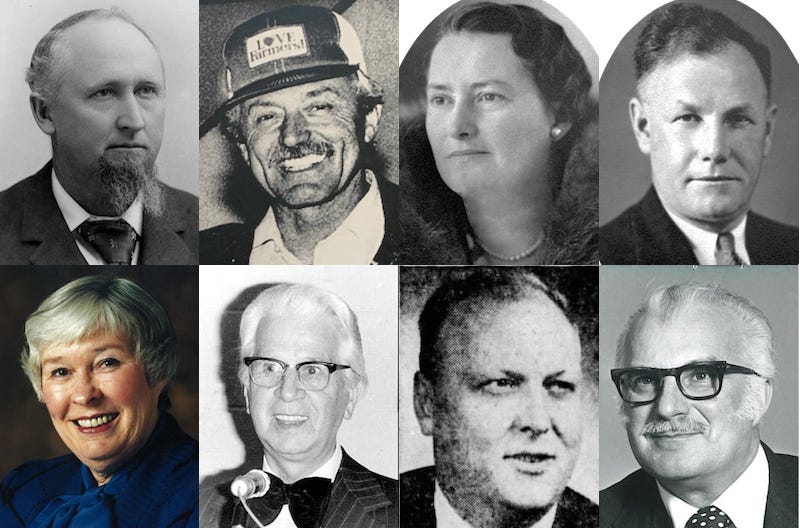
The political history of Alberta is filled with larger than life characters. I read a lot about Alberta history, and while politicians like William Aberhart, Ernest Manning, Peter Lougheed, and Ralph Klein dominate the history books, I have frequently come across some really interesting lesser known characters. I thought it would be interesting to share are a few of those names with you today.
1. John Leedy
Why did a former Governor of Kansas and Mayor of Valdez, Alaska jump into Alberta politics? John Leedy didn’t have much success in Alberta politics but that didn’t stop him from trying to get elected to the Legislature and the House of Commons in 1917 and to Edmonton City Council in 1926.
“Edmonton is so far north it would appear that even a Kansan’s desire to be a member of the legislature might be frosted,” wrote the Kansas City Star in April 1916. “If he gets into the Alberta legislature the Conservative Canadians will hear the Kansas language as she is spoke. For Leedy’s desire to go to the legislature shows that he is still a Kansan.”
I wrote more about John Leedy in 2021.
2. Nick Taylor
He was never Premier of Alberta or even Leader of the Official Opposition, but Nick Taylor was a giant in Alberta politics nonetheless. The quick-witted and sharp-tongued oilman-turned-politican with swept-back silver hair and a droopy moustache was a fixture on the political scene for more than three decades. He was also probably one of the most persistent and determined politicians in our province’s recent history.
Taylor became leader of the Alberta Liberal Party in 1974 but it took him until 1986 to win a seat in the Legislature. He was the rarest of Alberta political species – a Liberal MLA from rural Alberta.
“His most endearing incarnation was as a feisty Alberta MLA whose decade of deadly zingers triggered a no-laugh order from two premiers, forcing many a Conservative MLA to guffaw below their desk to avoid detection from ministers reeling under his verbal fire,” columnist Don Martin wrote of Taylor in 2002.
After describing then-forestry minister Ty Lund as “one of the finest examples of a Victorian environment minister I’ve ever met,” Taylor stung him with a nickname that stuck for years: Forest Stump.
He also legendary for getting the word “cowbell” banned from use in the Legislative Assembly after describing a group of PC backbenchers as having the “longest tongues and emptiest heads” in the building.
“His wit made him very engaging and a great deal of fun to work with, but he was so much more than that. The nature of his wit was an indicator of his intelligence,” said former Liberal MLA Grant Mitchell, who served with Taylor in the Legislature.
I wrote about the quick-witted Taylor after his death in 2020.
3. Edith Rogers
An early convert to William Aberhart's Social Credit preachings, Edith Rogers ran under the party banner in 1935 and defeated former premier John Brownlee in the Ponoka riding.
As a prominent Aberhart acolyte, Rogers was considered one of the strongest candidates the Socreds could run against the former premier (she was also nominated by Socred associations in five other ridings who hoped she would be on their ballots, but Aberhart chose her to run in Ponoka).
Brownlee was running for re-election as a United Farmers of Alberta MLA but had resigned his premiership in 1934 after being caught in a sex scandal with an 18-year old clerk who worked in the Attorney General’s office. It was the most prominent of the “morality scandals” that plagued the UFA during its final years as government (another scandal included an alleged “wife-swapping” involving the former Speaker of the Assembly and the Lieutenant Governor’s aide-de-camp).
Despite her previous loyalty to Aberhart, Rogers sided with the insurgents in the 1937 backbenchers' revolt and was defeated in her bid for re-election in 1940.
Soon after her electoral defeat, Rogers abandoned Social Credit for the left-wing Cooperative Commonwealth Federation. In his book, The Social Credit Phenomenon, Alvin Finkel wrote that this political move was surprising considering she "seemed more interested in monetary reform than in the general social critique put forward by the CCF."
In a 1942 report in the Edmonton Bulletin, Rogers said the Social Credit party was content to nationalize the banking system, but would not interfere with private enterprise. She was of the opinion that the profit system of private enterprise was as vicious as that of interest. It was on this issue, she said, that she was supporting the CCF.
Rogers ran as a CCF candidate for the Edmonton Public School Board in 1942 and City Council in 1944 and 1946, was elected president of the Edmonton West CCF constituency association in 1946 and president of the Edmonton CCF organization in 1948. She was unsuccessful in her bid to win a CCF nomination to run in Edmonton in the 1948 provincial election.
She was elected as a public school trustee in Edmonton in 1959 and was re-elected six times until her retirement from politics in 1974.
Former Liberal Party leader Harper Prowse described Rogers as “a real bulldog.” “She’s a vigorous fighter for what she thinks is right,” he told the Edmonton Journal in a 1962 interview.
4. Joseph Unwin
Elected in the 1935 Social Credit sweep, Edson MLA Joseph Unwin is best known for his involvement in the Bankers' Toadies incident.
While serving as the Whip of the Social Credit caucus, Unwin and British Social Credit expert George Powell were arrested when police raided Social Credit headquarters following the printing of a pamphlet advocating the “extermination” of nine prominent Edmontonians. The nine men, labelled in the pamphlet as “Bankers’ Toadies,” included Conservative Party leader David Duggan and Senator and former mayor William Griesbach.
The arrests were protested and denounced by the national convention of the Communist Party of Canada, which claimed the arrests were part of a plot to overthrow the radical Socreds and install a right-wing coalition government in Alberta.
After a high-profile trial that drew national attention, Unwin was sentenced to 3-months hard labour for a libel charge, which was later overturned by the federal Attorney General. He did not resign as an MLA when he went to jail and his release was cheered during an appearance at the Social Credit victory parade celebrating the party’s win in the 1938 Edmonton East federal by-election (held on the same day of his release).
His return to the Legislature was celebrated by Social Credit MLAs with a chorus of “For he’s a jolly good fellow” and a “snake dance” on the floor of the Assembly.
Despite his newfound hero-status among Social Credit partisans, Unwin’s political career didn’t last much longer. He was defeated by Labour Party candidate and United Mine Workers president Angus Morrison in the 1940 election.
5. Bettie Hewes
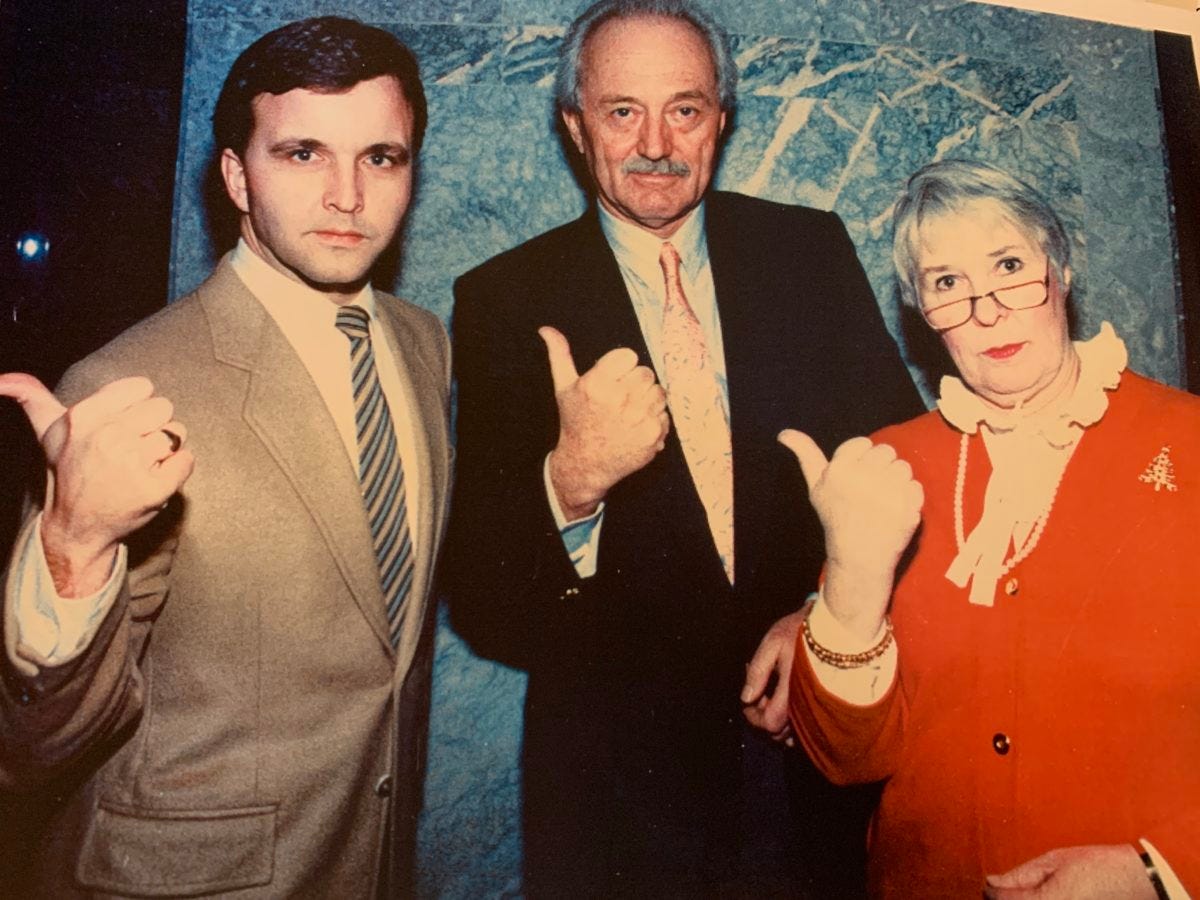
A trailblazer in Alberta politics, Bettie Hewes was first elected to Edmonton City Council in 1974 as a leading member of the Urban Reform Group Edmonton (URGE). URGE was a municipal coalition concerned about the rapid growth of the city and promoted the retention of older neighbourhoods, the development of green spaces, and improved public transit.
William Thorsell wrote of Hewes when she left city council to become chairperson of Canadian National Railway Board of Directors in 1984:
“Bettie was a legend in her own thyme - an excellent cook - who kept a rabbit in the back hall of her home. She drove a lime green sports car, erratically. She wore expressive clothes. She was wise and exceptionally warm. She was brave.”
Hewes was dropped from the CN board when Brian Mulroney’s Progressive Conservatives swept the 1984 federal election, but she wasn’t out of the public spotlight for long. Soon after she jumped into provincial politics, running for the Alberta Liberals, a party that hadn’t elected an MLA since 1967. Likely on the basis of her own personal popularity, she was elected as the Liberal MLA for Edmonton-Gold Bar in 1986.
Her reputation as a tough critic in the Legislature earned her the nickname The Great White Granny, the grande dame of Alberta politics. “I am a great white granny,” Hewes once said. “But like all politicians, don’t mistake, I have an edge of ruthlessness.”
She was re-elected in 1989 and in 1993 she earned more votes than any other candidate in that year’s election. She served as interim leader of the Official Opposition Liberals in 1994 and did not run for re-election in 1997.
“She was so tough-minded, so capable,” said former PC cabinet minister Stockwell Day in 2001. “Getting into an argument with Bettie Hewes was like getting into an argument with your mother. It didn’t matter. You just couldn’t win.”
“That mixture of warmth and toughness, of empathy and intellect, made Hewes a force to be reckoned with,” wrote Edmonton Journal columnist Paula Simons in 2001.
6. Chester Ronning
Born to Lutheran missionaries in China and well-known as the Principal of the Camrose Lutheran College (now the Augustana Campus of the University of Alberta), Chester Ronning was elected to the Alberta Legislature in a 1932 by-election under the United Farmers of Alberta banner and only briefly served in the Legislature until his party was wiped out in 1935. But his political story didn’t end there.
Like many of his UFA comrades, he was also an outspoken adherent of the new Cooperative Commonwealth Federation, and in 1940 became the first leader of the Alberta CCF.
“Socialism is achieved only when the principle of democracy is extended to all aspects of our lives,” Ronning once said. “I’ve always been in favour of fundamental revolutionary changes in our politics, economics, society, education and all institutions that affect our lives.”
Ronning led the Alberta CCF into the 1940 election but was unable to win back his Camrose riding in that election or in a 1941 by-election in the same riding. He stepped down as leader soon after that but tried again to get elected in the 1945 federal election.
His frequent trips to China throughout his life and his familiarity with the language and cultural differences that confounded many westerners at the time made him a valuable resource for the Canadian government. Soon after he left politics he was called by Ottawa to serve in diplomatic and ambassadorial posts in China, Norway, India and the United Nations, and would later undertake special missions to Hanoi in an attempt to mediate an end to the Vietnam War.
Ronning was the last Canadian diplomat to leave China following Mao Zedong’s victory in the civil war and the formation of the People’s Republic of China. He is reported to have repeatedly urged the Canadian government to recognize the PRC as the legitimate government of China, but pressure from the United States and lobby groups delayed that inevitability for another two decades.
In 1973, Ronning was invited by China’s Premier Zhou Enlai to join him in welcoming Prime Minister Pierre Trudeau at the Peking Railway station during the Canadian Prime Minister’s first visit to the People’s Republic.
“Ronning’s life is an extraordinary combination of talent and circumstances. As a child in China he learned first to speak Chinese, followed by English and Norwegian, linguistic skills that were basic to his later triumphs as a diplomat,” said University of Alberta professor emeritus Brian Evans in 2013. “Ronning’s childhood and early teens in China strongly influenced the rest of his life. He absorbed a mix of Confucian social values and revolutionary urges for reform, which informed his approach to Alberta politics in later years.”
Evans’ spoke about Ronning’s history as a politician and diplomat in 2010. Alberta documentary filmmaker Tom Radford directed a 1980 film about Ronning’s time in China.
7. Walter Makowecki
Walter Makowecki is best known for his role as the founder of Heritage Frozen Foods Ltd, but before he made Cheemo perogies a household name in North America, he was an organizer for the Communist Party in Alberta and owner of a communist bookshop in Edmonton.
Makowecki ran under the Communist banner in the 1963 provincial election in Edmonton-Norwood and the 1965 federal election in Vegreville. He also ran for Edmonton city council in 1964, 1966, 1968 and 1980.
Makowecki is reported to have been inspired to start his perogy business after seeing the demonstration of advance food production at the Soviet Union pavilion at the 1967 Expo in Montreal. He would soon after travel to the USSR to study and bring back food production technology to Alberta. He later became a respected businessman and was referred to by the local media as a "communist capitalist."
In an interview with the Edmonton Journal in 1984, Makowecki described himself as more of an evolutionist than revolutionist, arguing that change will be mandated by industrial progress. He told the Journal he became a capitalist when he couldn’t get a job here because of his beliefs.
The Alberta Labour History Institute interviewed Makowecki in 2003.
8. John Kushner
It may have taken John Kushner seven times before he actually won an election to public office but after that he never looked back and made himself a fixture of politics in Calgary. An immigrant from Poland, Kushner rose through the ranks of the Brotherhood of Railway Trainmen to the presidency of the local and of the Calgary Labour Council before he was finally elected to Calgary City Council for the first time in 1965.
After unsuccessful attempts at the mayor’s office in 1967 and as a Progressive Conservative candidate in the 1971 provincial election, and successfully serving concurrent roles as city councillor and school board trustee, he was elected to the Legislature as the PC MLA for Calgary-Mountain View in 1975.
That win didn’t come without controversy.
Defeated Social Credit MLA Albert Ludwig accused Kushner of dirty tricks, claiming the PC campaign violated the Elections Act by donating 20 gallons of root beer to a Renfrew community association event. The Great Root Beer Scandal of 1975 went flat after Kushner denied all knowledge and explained it was his 22-year old son, Jack, not his campaign, who donated the gallons of tasty soda.
Kushner would not stick around the Legislature for long. By the end of his first term as an MLA he had already won the nomination to run as the federal PC candidate in Calgary East, where he again faced then-Liberal candidate Ludwig in 1979 and 1980. Kushner won handily both times.
As he rocketed through political offices, he became a master of local retail politics and amassed a significant following of loyal supporters in east Calgary.
The Calgary Herald described Kushner as a political paradox of the first order.
“He does combine a certain amount of opportunism with his enthusiasm,” said Liberal leader Nick Taylor in 1979. “Maybe it’s a little more obvious than most politicians.”
Matching Taylor’s well-known rhetorical flair, Kushner responded by describing the Liberal leader as “a little like a cross-eyed discus thrower. You never know where he’ll hit."
Kushner served as MP for Calgary East until his death in 1984.
His son Stan Kushner succeeded him as the PC MLA for Calgary-Mountain View in 1979 (defeating Doreen Orman, mother of future Calgary-Montrose MLA Rick Orman), and his other son, Jack (of root beer fame), attempted to succeed him as the MP for Calgary East in 1984 but lost the PC nomination vote to Alex Kindy.
More colourful characters
I asked subscribers who follow Daveberta on the subscriber chat (see link below) who would be on their list of notable characters from Alberta’s history. Here are a few of the names they shared:
Ken Kowalski - One of the kingmakers in the 1992 PC leadership race that chose Ralph Klein as Premier, Kowalski served as Klein’s deputy premier. He was widely seen as the real power behind the Premier’s Office until Klein removed him from cabinet. He later made an unexpected comeback as Speaker of the Legislative Assembly in 1997 and served in the role until his retirement from politics in 2012.
Rod Love - Ralph Klein’s righthand man in the Mayor’s Office and the Premier’s Office.
William Hawrelak - A Mayor of Edmonton whose three separate periods in office were interrupted by judicial rulings of gross misconduct and allegations of corruption. He ended up bouncing back from each defeat and eventually died in office in 1975.
Graham Harle - The Alberta Solicitor General who resigned from cabinet in 1983 after he was caught by police in a Government of Alberta vehicle with a prostitute. Harle claimed that he was conducting a personal investigation of prostitution control and was seeking "firsthand information.” He was the PC MLA for Stettler from 1972 to 1986.
John Brownlee - UFA Premier of Alberta from 1925 until 1934, when he resigned after a sex scandal. He later served as President of the United Grain Growers from 1948 to 1961.
Thank you.
Thank you to everyone who has read, subscribed and shared the Daveberta Substack.
I am looking forward to sharing more fun Alberta politics and history columns over the summer that I think many of you will enjoy.
If you like what you read on here, feel free to share it with a friend or colleague or post it on your social media. And if you have any feedback, please leave a comment below or send me an email.
Thanks,
Dave


